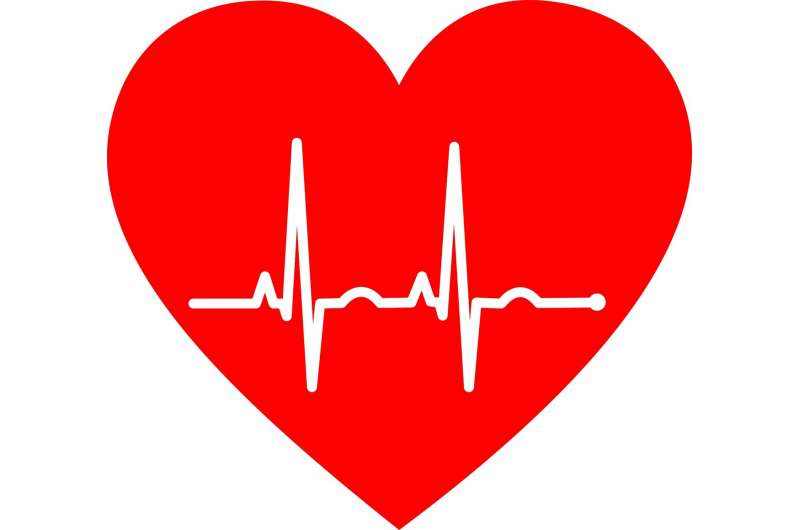Mobile app for improving heart health among African Americans shows promise, study finds

Mobile apps are popular tools for people looking to improve their health, but are they effective? They can be if the app is culturally tailored to the needs of its users.
In a study published on Monday, July 18, in Circulation, Mayo Clinic researchers evaluated the effectiveness of a culturally relevant mobile app designed to improve heart health among African Americans in faith communities. The researchers found that people who participated in a 10-week clinical trial using the app experienced significant improvements in overall heart health scores and improvements in key heart health behaviors related to diet and physical activity.
African Americans are disproportionately affected by cardiovascular disease, compared to the general population. Those differences are driven by underlying cardiovascular risk factors, as well as social and economic inequality, according to a report from the American Heart Association.
"Our study is the first of its kind integrating an innovative, community-vetted, smartphone-based app into a randomized clinical trial to improve overall heart health among African Americans," says LaPrincess Brewer, M.D., a Mayo Clinic preventive cardiologist and principal investigator of the study. "Our results are promising in that they demonstrate the potential of mobile technologies to positively influence health behaviors that are challenging to change: diet and physical activity."
This study was part of a community research program called Fostering African American Improvement in Total Health, or FAITH! The FAITH! Program is an academic-community partnership focused on addressing health disparities, particularly related to heart health in African American communities. More than 100 African American churches in Rochester and the Twin Cities are active in the FAITH! Program, which Dr. Brewer has led at Mayo Clinic since 2013. The FAITH! app is a community-driven project, co-designed with the help of FAITH! community partners. The app is not currently available to the public as research continues.
The study
African American churches were recruited to participate through existing FAITH! Program contacts and using citywide advertisements. Participants were recruited through in-person and virtual events hosted by the churches, direct referrals from church staff and by self-referral. When assigning participants to the intervention group or the control group, randomization was done at the church level rather than the individual level to keep communities together.
The app-based intervention included:
- Culturally tailored education modules addressing stressors and health disparities affecting African Americans; the importance of health equity and advocating for oneself in clinical settings; and practical strategies to overcome barriers to better health, such as heart healthy recipes based on traditional African American cuisine.
- American Heart Association Life's Simple Seven focused modules addressing diet, physical activity, smoking, body mass index, blood pressure, cholesterol and glucose.
- Diet and physical activity self-monitoring.
- A group sharing board.
In addition, churches used thermometer goal charts to track church-level progress on diet and physical activity goals, encouraging social support for participants and friendly competition with other participating churches.
Researchers evaluated each participant's average change in mean heart health score on a scale of 0 (poor) to 14 (ideal) from baseline to six months following the intervention. Among participants in the intervention group, average heart health scores increased by nearly two points, compared to less than one point the control group. Participants in the intervention group also significantly improved key heart health behaviors related to diet and physical activity.
This study builds on previous research that assessed the feasibility of the mobile app intervention, supported the potential benefits of the app, and evaluated the design and content of the app with the help of community focus groups.
Importance of collaborating with faith communities
According to Christi Patten, Ph.D., a Mayo Clinic psychologist and senior author, this study not only demonstrates the effectiveness of the app, but also it underscores the value of relationships and collaborations among researchers and communities to collectively create effective and culturally relevant digital interventions to improve heart health.
The Rev. Daniel McKizzie, pastor at New Creation Baptist Church in Minneapolis, agrees, expressing his appreciation for the opportunity for his church to participate in the FAITH! app clinical trial.
"Being a leader in the faith community, I found it important for me not only to communicate the benefit of a culturally relevant app, but also lead by example and experience it for myself," says McKizzie. "The result was many participants from our church."
The researchers indicate that next steps in their research will involve assessing the utility and efficacy of the FAITH! app in clinical care and health system settings. The study team is examining the app in federally qualified health centers to improve hypertension management in African American patients.
More information: LaPrincess C. Brewer et al, Community-Based, Cluster-Randomized Pilot Trial of a Cardiovascular Mobile Health Intervention: Preliminary Findings of the FAITH! Trial, Circulation (2022). DOI: 10.1161/CIRCULATIONAHA.122.059046




















